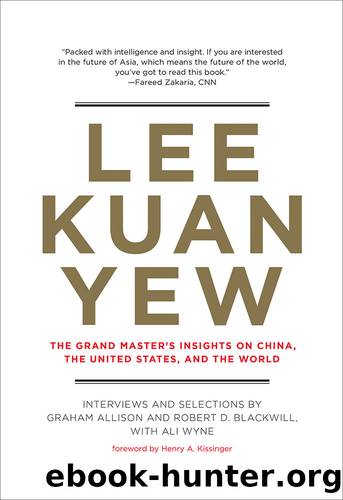Lee Kuan Yew (Belfer center studies in international security) by Graham Allison & Robert D. Blackwill & Ali Wyne

Author:Graham Allison & Robert D. Blackwill & Ali Wyne [Allison, Graham]
Language: eng
Format: mobi
Tags: international relations, Singapore, Lee Kuan Yew, Asia, United States, China, politics
ISBN: 9780262312745
Publisher: The MIT Press
Published: 2013-01-31T16:00:00+00:00
What role do more intangible factors such as values play in driving growth and competitiveness?
Besides the standard economic yardsticks for productivity and competitiveness, there are intangible factors like culture, religion, and other ethnic characteristics and national ethos that affect the outcomeâ¦For a modern economy to succeed, a whole population must be educatedâ¦China has built much better physical infrastructure than Indiaâ¦The Chinese bureaucracy has been methodical in adopting best practices in their system of governance and public policiesâ¦All said and done, it is the creativity of the leadership, its willingness to learn from experience elsewhere, to implement good ideas quickly and decisively through an efficient public service, and to convince the majority of people that tough reforms are worth taking, that decide a countryâs development and progress.18
More important than technological capabilities is the spirit of innovation and enterprise. In an era of startling technological change, it is the enterprising individuals, prepared to seize new opportunities, the creators of new ideas and businesses, who forge ahead. Ordinary businesspeople can make a living by being good followers, but the rich rewards go to innovators and entrepreneurs.19
Where do you produce your entrepreneurs from? Out of a top hat?â¦There is a dearth of entrepreneurial talent in Singaporeâ¦We have to start experimenting. The easy thingsâjust getting a blank mind to take in knowledge and become trainableâwe have done. Now comes the difficult part. To get literate and numerate minds to be more innovative, to be more productive, is not easy. It requires a mindset change, a different set of values.20
Habits that make for high productivity in workers are the result of the values implanted in them at home, in school, and at the workplace. These values must be reinforced by the attitudes of society. Once established, like a language a society speaks, the habits tend to become a self-reproducing, self-perpetuating cycleâ¦I am astonished to findâ¦that 55% of our workers still admit to the fear of being disliked by fellow workers for doing their job well. As long as this attitude persists, higher performance will be discouraged by the prevailing standards of mediocre workers. Better workers will refrain from becoming pace-setters. This attitude is negative. Singaporeans must understand that their group interests will be advanced if each worker strives to achieve his best, and thus encourages his peers to do better, by his example. There is no better way than the personal example of managers and grassroots leaders to bring about this change of attitudes and values. Old-fashioned notions that managers are out to exploit workers are irrelevant in todayâs industrial climate. Equally outmoded also are management views that trade unionists are troublemakers. These are mindsets of the past. They are stereotypes to be banished if we are to build up relationships of confidence and cooperation between management, unionists, and workers.21
We have focused on basics in Singapore. We used the family to push economic growth, factoring the ambitions of a person and his family into our planning. We have tried, for example, to improve the lot of children through education.
Download
This site does not store any files on its server. We only index and link to content provided by other sites. Please contact the content providers to delete copyright contents if any and email us, we'll remove relevant links or contents immediately.
| Anthropology | Archaeology |
| Philosophy | Politics & Government |
| Social Sciences | Sociology |
| Women's Studies |
The Secret History by Donna Tartt(16611)
The Social Justice Warrior Handbook by Lisa De Pasquale(11486)
Thirteen Reasons Why by Jay Asher(7783)
This Is How You Lose Her by Junot Diaz(5754)
Weapons of Math Destruction by Cathy O'Neil(5032)
Zero to One by Peter Thiel(4818)
The Myth of the Strong Leader by Archie Brown(4786)
Promise Me, Dad by Joe Biden(4441)
Stone's Rules by Roger Stone(4413)
Beartown by Fredrik Backman(4405)
How Democracies Die by Steven Levitsky & Daniel Ziblatt(4393)
The Fire Next Time by James Baldwin(4338)
100 Deadly Skills by Clint Emerson(4072)
A Higher Loyalty: Truth, Lies, and Leadership by James Comey(4027)
Rise and Kill First by Ronen Bergman(4009)
The David Icke Guide to the Global Conspiracy (and how to end it) by David Icke(3876)
The Farm by Tom Rob Smith(3870)
Secrecy World by Jake Bernstein(3774)
The Doomsday Machine by Daniel Ellsberg(3726)
